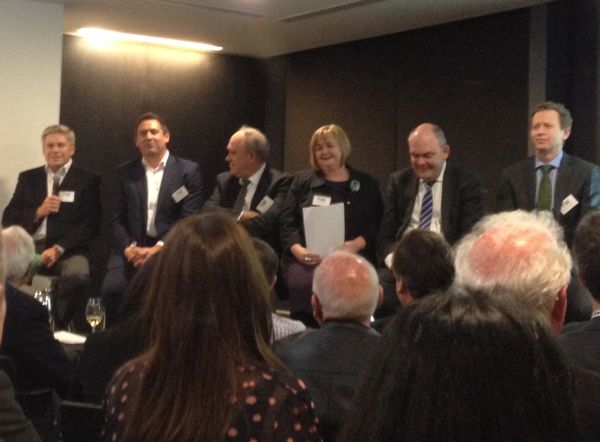Published on the 04/09/2014 | Written by Newsdesk

Electioneering focused on the tech sector this week with a political debate in front of the country’s top high-tech companies where politicians aired their science, technology and innovation policies…
This week the Technology Investment Network, authors of the TIN100+ report on the performance of New Zealand’s high tech sector, hosted an engaging political debate on how the three major parties plan to support the technology sector. One hundred and fifty TIN100 participants and media attended the event hosted by Ernst & Young against the backdrop of Auckland’s Hauraki Gulf at night.
Debate participants included the Honourable Steven Joyce (National), Dr Megan Woods (Labour) and Dr Russell Norman (Greens), and three science and technology industry CEOs – Allan Benbow of Metalform, Greg Muir of Tru-Test and Craig Richardson of Wynyard Group – and chaired by Technology Investment Network managing director Greg Shanahan.
All in all the debate was good-natured and served to highlight the extent to which the three parties’ goals for the hi-tech sector align, while the methods by which they plan to achieve them diverge.
All agreed that investing in R&D is critical to driving economic growth. The Greens and Labour want to bring back R&D tax credits, saying that businesses know where the money needs to go and the incentive will mitigate the underinvestment from the private sector. Woods said Labour would halve Callaghan grants and reintroduce R&D tax credits if elected, with the caveat that tax be repaid if the company goes offshore within three years. Norman also raised the idea of a green investment bank similar to the one in the UK which invests in green projects on commercial terms.
Joyce, who began by congratulating the industry on the progress it has made this year, said he was targeting R&D at one percent of GDP by 2018 and was now “completely confident” we can achieve that – the real problem is the lack of investment from the private sector. Not surprisingly he said he was happy with the grants structure as it is. He was backed by Benbow who said he had found it very easy to work with the Callaghan Institute for grants and suggested that R&D credits would be a “scattergun approach” to funding. Joyce also pointed to the student grants and new incubator programmes that are geared towards supporting innovation and research.
Speaking about their most hated opposition policies, Labour’s Woods discussed the discontinuation of post graduate student loans. She firmly believes in the important role they play, saying, “human capital is absolutely critical to the New Zealand economy”. She wants to see more people with post grad qualifications not just in academia but working in industry.
Asked if the current curriculum taught children how to be innovative and creative the panel was unanimous in saying more could be done, but each political party had a different take on how it could be achieved. Labour’s Woods said she thinks New Zealand has one of the best curriculums in the world and plans to target improved science and innovation in schools through professional development for teachers.
The Green’s Norman said we need to a step back and target the issue of child poverty. With one in four school children living in poverty a quarter of the school-going population’s ability to learn is severely compromised.
National’s Joyce admitted that traditional education is not very good at maintaining children’s innate creativity and a range of solutions in schools is needed. National’s Science in Society Project, launched in July this year, for example, aims to support initiatives that promote engagement with science with over $10 million dedicated to supporting its initiatives.
Muir voiced the unpopular opinion that it is the demand side that is to blame for the lack of high-tech skills. If we build more large scale organisations like Orion Health and Xero that stay headquartered in New Zealand there would be less of a problem he argued. This may be the case for the agri-tech sector but doesn’t seem to ring true for software development where the more common complaint is ‘we can’t get the skills’. Wynyard Group’s Craig Richardson said that companies moving offshore is just “the nature of doing successful business” but the Green’s Norman was concerned that too many New Zealand companies leaving would lead to a reduction in all-important critical mass and momentum. Joyce also pointed out that those entrepreneurs that have sold their companies to overseas investors have often gone on to do great things in New Zealand with the money they generated.
Technology is New Zealand’s fastest growing sector and the country’s third largest export earner behind dairy and tourism, so overall, as debate chair Shanahan said, it was heartening to see the main political parties are invested in New Zealand science and innovation.
After the debate the Technology Investment Network announced the ‘Ten Hot Emerging Companies’ and ‘EY Top Ten Companies to Watch’ lists, with the following results:
Companies to Watch:
1. Fisher & Paykel Healthcare
2. BCS Group
3. Orion Health
4. NDA Group
5. Diligent Board Member Services
6. Xero
7. Tru-Test
8. Fisher & Paykel Appliances
9. AFT Pharmaceuticals
10. Datacom Group
Hot Emerging Companies:
1. Enprise Group
2. Ceiba Solutions
3. Phitek Systems
4. Snakk Media
5. RML Engineering
6. Vend
7. Metalform
8. Data Torque
9. Agility CIS
10. Serko
You can read the Twitter stream of the whole debate at www.twitter.com search term: #TINDebate



























